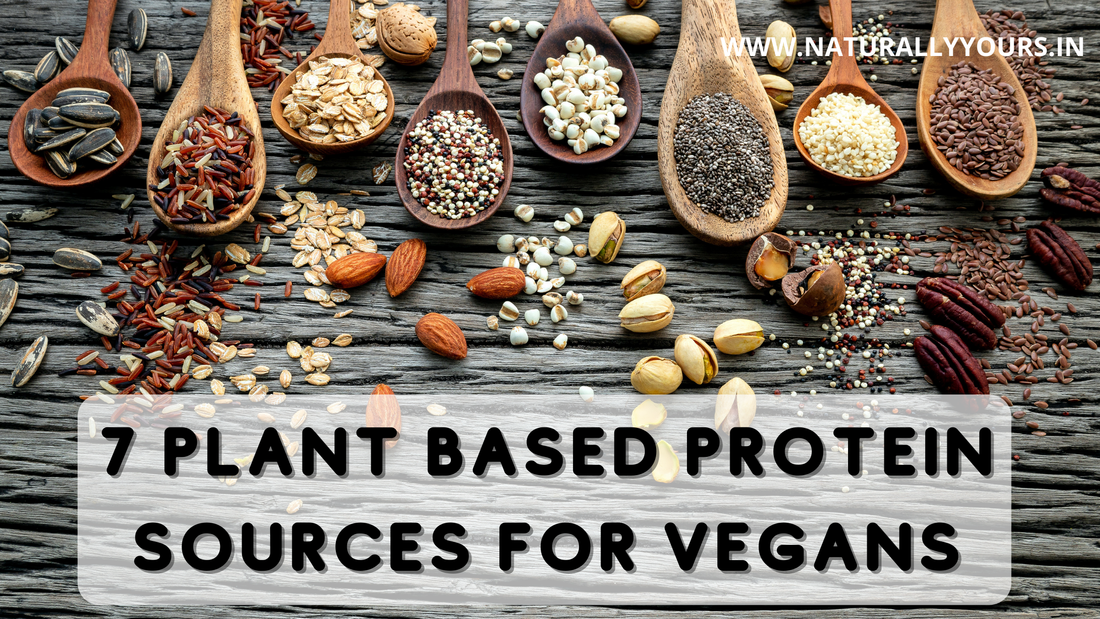
Top 7 sources of plant based proteins for vegans
Naturally YoursShare

The myth that only animal based products can give you sufficient proteins has been proven wrong by both scientists and athletes alike. Including our very own Virat Kohli, some of the best sportspeople today credit the vegan diet for their optimum fitness and endurance levels. Below are some of the best sources of proteins for vegetarians.
1. Quinoa :
Quinoa is one of the best sources of plant based proteins. It is called a complete protein because it contains sufficient amounts of all the essential amino acids. One cup (about 185g) of cooked quinoa provides about 8 grams of protein.
Apart from proteins, it is also an excellent source of dietary fibers, antioxidants, vitamins and minerals.
How to use : Quinoa does not have dominating taste of its own and hence can be used in a variety of dishes like salad, pulao, upma or it can be used in the flour form in chapathi, dosas etc.
2. Chia seeds
Chia seeds are tiny power-packed superfoods that are loaded with several vital nutrients including proteins, Omega 3, fiber, iron and calcium. According to the United States Department of Agriculture (USDA) National Nutrient Database, 2 Tbsp of chia seeds (28g) contains 4.69g of protein.
Sprinkle them on salads or breakfast cereals, add it to your favorite smoothie, lemonade, yoghurt or fold them in while making bread, cookies, cakes, chapathi etc.
3. Chickpeas
Chickpeas or Kabuli chana are a great source of plant based proteins. A 28g serving of chickpea provides 3g of proteins. They are also high in vitamins, minerals and dietary fiber.
How to use: Apart from the all time favorite chole masala, chickpeas can be used in salads, hummus and also as a roasted snack.
4. Millets
Millets are one of the highest in terms of protein content and quality. They are also an excellent source of calcium. Some of the traditional varieties of millets in India are foxtail millet, little millet, kodo millet, barnyard millet, proso millet, ragi, bajra and jowar.
How to use : Traditionally millets are sprouted and ground to make porridge for babies as a weaning food. Sprouting increases the bioavailability of nutrients in the millets thus increasing its health benefits manifold. It is not only highly nutritious but also easy to digest for the young ones.
Millets can also be cooked and consumed like rice. It can be ground into flour, which can be used for making roti, cookies, cakes, malt, dosa etc. Ragi malt is a simple, delicious and nourishing health drink suitable for all ages.
5. Lentils
Lentils are highly nutritious and flavourful thus making it an ideal choice for healthy everyday cooking. Especially red lentils are an excellent source of proteins. 1 bowl (about 50g) of cooked red lentil contains 12 g of protein which basically translates to 30% of your recommended daily protein intake.
How to use : Lentils can be used in a variety of dishes like soups, stew, dal etc. This low calories and high protein superfood is also a great alternative to refined flour which has zero nutrients. Hence companies like Naturally Yours have developed nutritious gluten free pasta made of red lentils. So, even when you are enjoying a delicious bowl of pasta, you do not have to compromise on the health factor.
Health tip : Red lentils are a good source of iron too and hence would make a good addition to the diet especially for menstruating/pregnant women, children and adolescents who are at more risk for iron deficiency.
6. Soya beans
Soya beans are among the best sources of plant based proteins. 100g of cooked soyabean contains 16.6g of proteins. It is also a good source of dietary fibers, vitamins and minerals.
How to use: Soya beans can be made into a healthy curry. It can also be ground into flour and used as a thickening agent in gravies and sauces, or it can be added to baked goods, chapathis etc. Other forms of soya like soy milk, tofu, miso paste and roasted soya beans are also healthier alternatives to conventional products.
Health tip : The health benefits of soybean for menopausal women include lowered risk of osteoporosis, protection from coronary heart disease, and fewer hot flushes.
7. Nuts and seeds
Nuts and seeds are excellent sources of protein, particularly for vegans and vegetarians. High protein nuts and seeds include hemp seeds, pumpkin seeds, peanuts, almonds, pistachios, sunflower seeds, flax seeds, sesame seeds, chia seeds, cashews, and more.
How to use : Both nuts and seeds are the most ideal snacking options for those following a high protein diet. They can also be included in salads, smoothies, baked goods, laddoos, gravies or used as nut butters to give a health boost to any meal.
